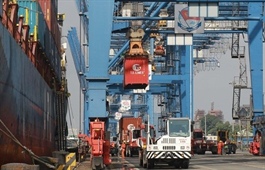Fitch affirms Viet Nam at 'BB'; outlook positive
Fitch affirms Viet Nam at 'BB'; outlook positive
Fitch Ratings has affirmed Viet Nam's long-term foreign-currency issuer default rating (IDR) at 'BB' with a positive outlook.

According to Fitch, the pandemic has had a smaller impact on Viet Nam's public finances than the 'BB' median, as early success in containing the pandemic allowed for a restrained fiscal response.
“We forecast Viet Nam's general government debt-to-GDP ratio will rise to about 42 per cent by 2023 from an estimated 39.7 per cent in 2021, based on the authorities' recently revised GDP data series. This is well below the 'BB' median of 54.5 per cent in 2022 and 55.3 per cent in 2023. Government debt to revenue of 213.5 per cent is lower than the 'BB' median of 239.3 per cent,” Fitch said.
Under a report released on Monday, the rating agency said: “The affirmation reflects continued strong medium-term growth prospects, despite the COVID-19 pandemic and the global economic spillovers from the war in Ukraine, and strong external finance metrics relative to peers.”
Fitch noted the rating remains constrained by contingent liability risks associated with the large State-owned enterprise (SOE) sector and structural weaknesses in the banking sector.
Under the report, Fitch said: “We expect GDP growth to accelerate to 6.1 per cent in 2022 and 6.3 per cent in 2023 from 2.6 per cent in 2021, led by a recovery in domestic demand, strong exports and high FDI inflows, particularly in the manufacturing sector.”
“Risks to our growth outlook remain, including the global economic implications of the war in Ukraine and sanctions on Russia, further pandemic-related shocks and high commodity prices,” Fitch said, noting its forecasts for Viet Nam's GDP growth factor in its most recent downward revision to global growth to 3.5 per cent in 2022 from 4.2 per cent.
According to Fitch, Viet Nam's economic prospects remain susceptible to shifts in external demand due to the economy's high degree of openness. However, the rating agency expects the export sector to continue to perform well in the medium term, benefitting from Viet Nam's cost competitiveness, trade diversion from China and implementation of key trade agreements.
Besides, Fitch noted Viet Nam’s export-related FDI inflows have not weakened despite the supply disruptions in Q3 2021. Inward investment remained strong in 2021 at US$19.7 billion, down marginally from $20 billion in 2020.
“We are factoring in a gradual resumption of tourism inflows from 2022, although pandemic-related disruptions remain a significant risk to our forecasts. Under our baseline, we forecast a reversal to a current account surplus in 2022 and 2023 from a deficit of about 1 per cent of GDP in 2021,” Fitch said in the report.
According to Fitch, Viet Nam’s foreign-exchange reserves continued to improve in 2021, as the State Bank of Vietnam (SBV) intervened in the foreign-exchange market to stabilise the currency. Foreign-exchange reserves rose further to a record of $109.4 billion by end-2021, supported by large FDI inflows.
“We forecast a gradual appreciation of the exchange rate, in line with our expectation of current account surpluses, although we expect the SBV to intervene in the case of excessive currency volatility or if the currency faces significant upward pressure. Viet Nam's large external buffers offer a cushion against shocks and support a strong external liquidity ratio, which was 340 per cent at end-2021, above the 175 per cent of the 'BB' median.”
The Vietnamese Ministry of Finance on the same day said Fitch’s affirmation resulted from the country’s active implementation of measures to stabilise the macro-economy, reform the financial-banking system and control the pandemic successfully.
The ministry affirmed it would continue to coordinate and share information with Fitch Ratings and other credit rating agencies and international organisations to help them have accurate and positive views on Viet Nam’s credit profile.


















